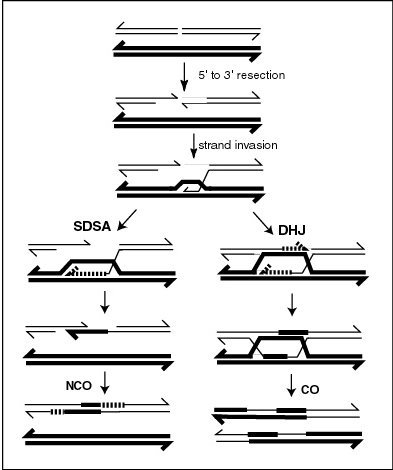DNA replication licensing factor MCM8 is a protein that in humans is encoded by the MCM8 gene.
The protein encoded by this gene is one of the highly conserved mini-chromosome maintenance proteins (MCM) that are essential for the initiation of eukaryotic genome replication. The hexameric protein complex formed by the MCM proteins is a key component of the pre-replication complex (pre_RC) and may be involved in the formation of replication forks and in the recruitment of other DNA replication related proteins. This protein contains the central domain that is conserved among the MCM proteins. This protein has been shown to co-immunoprecipitate with MCM4, 6 and 7, which suggests that it may interact with other MCM proteins and play a role in DNA replication. Alternatively spliced transcript variants encoding distinct isoforms have been described.
DNA repair
MCM8-deficient mice are defective in gametogenesis and display genome instability due to impaired homologous recombination. Male MCM8 (-/-) mice are sterile because spermatocytes are blocked in meiotic prophase I. Female MCM8(-/-) mice have arrested primary follicles and frequently develop ovarian tumors. MCM8 protein forms a complex with MCM9.
In the plant Arabidopsis thaliana, MCM8 is required for a pathway of meiotic DNA double-strand break repair. It was proposed that MCM8 is involved with RAD51 in a backup pathway that repairs meiotic double-strand breaks without yielding crossovers when the major recombination pathway, which relies on DMC1, fails.

MCM8 forms a complex with MCM9 that is required for DNA resection by the MRN complex (MRE11-RAD50-NBS1) at double strand breaks to generate single-stranded DNA ends. The formation of single-strand ends is an early step in homologous recombination (see Figure). MCM8/MCM9 interacts with MRN and is required for the nuclease action and stable association of MRN with double-strand breaks.
In humans, an MCM8 mutation can give rise to premature ovarian failure, as well as chromosomal instability.
See also
References
- ^ GRCh38: Ensembl release 89: ENSG00000125885 – Ensembl, May 2017
- ^ GRCm38: Ensembl release 89: ENSMUSG00000027353 – Ensembl, May 2017
- "Human PubMed Reference:". National Center for Biotechnology Information, U.S. National Library of Medicine.
- "Mouse PubMed Reference:". National Center for Biotechnology Information, U.S. National Library of Medicine.
- Gozuacik D, Chami M, Lagorce D, Faivre J, Murakami Y, Poch O, Biermann E, Knippers R, Brechot C, Paterlini-Brechot P (Jan 2003). "Identification and functional characterization of a new member of the human Mcm protein family: hMcm8". Nucleic Acids Res. 31 (2): 570–9. doi:10.1093/nar/gkg136. PMC 140502. PMID 12527764.
- ^ "Entrez Gene: MCM8 MCM8 minichromosome maintenance deficient 8 (S. cerevisiae)".
- ^ Lutzmann M, Grey C, Traver S, Ganier O, Maya-Mendoza A, Ranisavljevic N, Bernex F, Nishiyama A, Montel N, Gavois E, Forichon L, de Massy B, Méchali M (2012). "MCM8- and MCM9-deficient mice reveal gametogenesis defects and genome instability due to impaired homologous recombination". Mol. Cell. 47 (4): 523–34. doi:10.1016/j.molcel.2012.05.048. PMID 22771120.
- ^ Crismani W, Portemer V, Froger N, Chelysheva L, Horlow C, Vrielynck N, Mercier R (2013). "MCM8 is required for a pathway of meiotic double-strand break repair independent of DMC1 in Arabidopsis thaliana". PLOS Genet. 9 (1): e1003165. doi:10.1371/journal.pgen.1003165. PMC 3536722. PMID 23300481.
- ^ Lee KY, Im JS, Shibata E, Park J, Handa N, Kowalczykowski SC, Dutta A (2015). "MCM8-9 complex promotes resection of double-strand break ends by MRE11-RAD50-NBS1 complex". Nat Commun. 6: 7744. Bibcode:2015NatCo...6.7744L. doi:10.1038/ncomms8744. PMC 4525285. PMID 26215093.
- AlAsiri S, Basit S, Wood-Trageser MA, Yatsenko SA, Jeffries EP, Surti U, Ketterer DM, Afzal S, Ramzan K, Faiyaz-Ul Haque M, Jiang H, Trakselis MA, Rajkovic A (2015). "Exome sequencing reveals MCM8 mutation underlies ovarian failure and chromosomal instability". J. Clin. Invest. 125 (1): 258–62. doi:10.1172/JCI78473. PMC 4382257. PMID 25437880.
Further reading
- Volkening M, Hoffmann I (2005). "Involvement of human MCM8 in prereplication complex assembly by recruiting hcdc6 to chromatin". Mol. Cell. Biol. 25 (4): 1560–8. doi:10.1128/MCB.25.4.1560-1568.2005. PMC 548026. PMID 15684404.
- Gerhard DS, Wagner L, Feingold EA, et al. (2004). "The status, quality, and expansion of the NIH full-length cDNA project: the Mammalian Gene Collection (MGC)". Genome Res. 14 (10B): 2121–7. doi:10.1101/gr.2596504. PMC 528928. PMID 15489334.
- Ota T, Suzuki Y, Nishikawa T, et al. (2004). "Complete sequencing and characterization of 21,243 full-length human cDNAs". Nat. Genet. 36 (1): 40–5. doi:10.1038/ng1285. PMID 14702039.
- Johnson EM, Kinoshita Y, Daniel DC (2003). "A new member of the MCM protein family encoded by the human MCM8 gene, located contrapodal to GCD10 at chromosome band 20p12.3-13". Nucleic Acids Res. 31 (11): 2915–25. doi:10.1093/nar/gkg395. PMC 156728. PMID 12771218.
- Strausberg RL, Feingold EA, Grouse LH, et al. (2003). "Generation and initial analysis of more than 15,000 full-length human and mouse cDNA sequences". Proc. Natl. Acad. Sci. U.S.A. 99 (26): 16899–903. Bibcode:2002PNAS...9916899M. doi:10.1073/pnas.242603899. PMC 139241. PMID 12477932.
- Deloukas P, Matthews LH, Ashurst J, et al. (2002). "The DNA sequence and comparative analysis of human chromosome 20". Nature. 414 (6866): 865–71. Bibcode:2001Natur.414..865D. doi:10.1038/414865a. PMID 11780052.
- Bonaldo MF, Lennon G, Soares MB (1997). "Normalization and subtraction: two approaches to facilitate gene discovery". Genome Res. 6 (9): 791–806. doi:10.1101/gr.6.9.791. PMID 8889548.
This article on a gene on human chromosome 20 is a stub. You can help Misplaced Pages by expanding it. |



